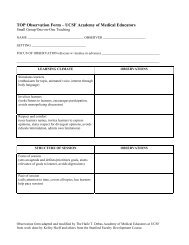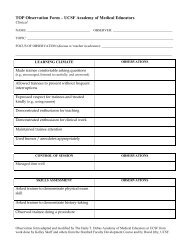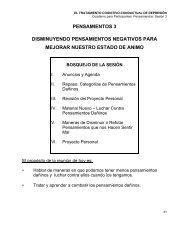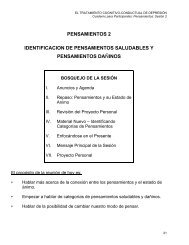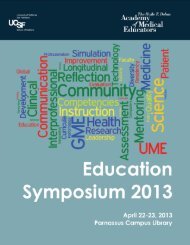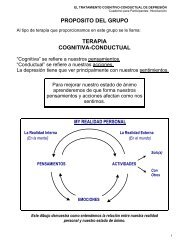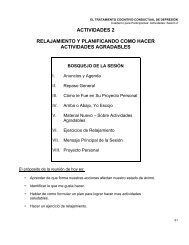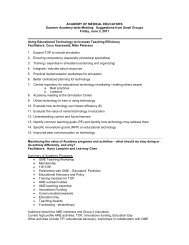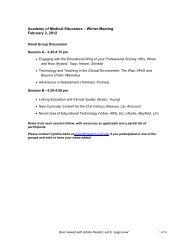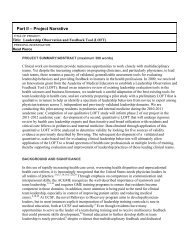<strong>UCSF</strong> Education Day <strong>2011</strong>From Silos to Certainty: CombiningResources to Create anInterdisciplinary Website to ImproveTrauma Education and Patient CareEric Lin, MD, Department <strong>of</strong> Anesthesia, <strong>University</strong> <strong>of</strong><strong>California</strong>, <strong>San</strong> Francisco, lineric@anesthesia.ucsf.edu;Ben Houseman, MD, PhD, Department <strong>of</strong> Anesthesia,<strong>University</strong> <strong>of</strong> <strong>California</strong>, <strong>San</strong> Francisco,Houseman@anesthesia.ucsf.edu; Esther Chen, MD,Department <strong>of</strong> Emergency <strong>Medicine</strong>, <strong>University</strong> <strong>of</strong><strong>California</strong>, <strong>San</strong> Francisco,esther.chen@emergency.ucsf.edu; Rochelle Dicker, MD,Department <strong>of</strong> Surgery, <strong>University</strong> <strong>of</strong> <strong>California</strong>, <strong>San</strong>Francisco, DickerR@sfghsurg.ucsf.edu; David Duong,MD, Department <strong>of</strong> Emergency <strong>Medicine</strong>, <strong>University</strong> <strong>of</strong><strong>California</strong>, <strong>San</strong> Francisco,David.Duong@emergency.ucsf.edu; Robert Mackersie,MD, Department <strong>of</strong> Surgery, <strong>University</strong> <strong>of</strong> <strong>California</strong>, <strong>San</strong>Francisco, rmackersie@sfghsurg.ucsf.edu; AndreCampbell, MD, Department <strong>of</strong> Surgery, <strong>University</strong> <strong>of</strong><strong>California</strong>, <strong>San</strong> Francisco, acampbell@sfghsurg.ucsf.eduAreas abstract covers: UME, GMEDomain(s) addressed: Computers and Technology,Curricular Innovation, Longitudinal Educational Activities,Patient CarePurpose: To create an internet resource that enhancestrauma education at <strong>San</strong> Francisco General Hospital(SFGH) by: (1) consolidating educational material fromthe anesthesia, emergency medicine, and surgerydepartments; and (2) providing always-accessiblecontent for learners from any department, training level,or trauma-related rotation.Background: The literature on workplace learning hasshown that there are common organizational factors thataffect learning in any field. Sharing <strong>of</strong> resources is onesuch factor that facilitates learning, while negativefactors include role uncertainty and emphasis on isolatedwork. Medical education studies have furtherdemonstrated that both undergraduate and graduatelearners struggle with such learning barriers, particularlywhen entering a new role or hospital. Staggered shiftsand rotation-centered traditions also hamper the sharing<strong>of</strong> practices and resources. One solution isasynchronous education through an interdisciplinaryonline resource.Methods: We developed a website to function as astand-alone web portal (sfghtrauma.org), with public andpassword-protected areas accessible at all times. SFGHfaculty with prominent roles in trauma education for eachdepartment contributed the curricular materials used foreach trainee rotation. The authors consolidated, created,and agreed upon the final content. All learners receivedwritten and verbal instructions to utilize the website astheir primary information source.Evaluation Plan: Evaluation <strong>of</strong> this work will investigatechanges in faculty teaching perceived learning outcomesfrom students and faculty, and end-<strong>of</strong>-rotationevaluations <strong>of</strong> the website.Dissemination: This resource will be discoverable viainternet search engines and continually accessible toboth the public and <strong>UCSF</strong> community. We plan topublish our outcomes in a relevant educational journal.We will publish our creation process for shared, topicbasedresources on AAMC MedEdPortal.Reflective critique: We are soliciting both learner andfaculty feedback through written questionnaires andfocus groups. Learner and faculty feedback will be usedto continually improve this resource for future learners.Leveraging a Near-Peer MedicalStudent to Improve Orientation andTraining on Portfolios andCompetency-Based DevelopmentAmanda Angelotti, MS2, <strong>UCSF</strong> <strong>School</strong> <strong>of</strong> <strong>Medicine</strong>,amanda.angelotti@ucsf.edu; Chandler Mayfield, <strong>UCSF</strong><strong>School</strong> <strong>of</strong> <strong>Medicine</strong>, chandler.mayfield@ucsf.eduAreas abstract covers: UME, GMEDomain(s) addressed: Communication, Competencies,Computers and Technology, PortfoliosPurpose: To develop near-peer orientation and trainingmaterials to address communications challenges whenpresenting portfolios and competency-baseddevelopment to medical students.Background: <strong>UCSF</strong> launched an electronic portfolio in2009 to support competency-based development. Afterits first year, students reported that they did notunderstand portfolio requirements, value, or purpose andthat technical resources were inadequate and confusing.Methods: A second year medical student developedand delivered a new student orientation session onportfolios and their relationship to competency-baseddevelopment to incoming first year medical students inthe fall <strong>of</strong> 2010. This session clarified how the portfoliosupports pr<strong>of</strong>essional development from the perspective<strong>of</strong> a near peer, provided examples <strong>of</strong> portfolios createdby fellow students and residents, and discussedcompetencies in student-friendly and approachableterms. The student also redeveloped existing onlineresources to clarify the purpose and requirements <strong>of</strong> theportfolio and improve and highlight the technical helpsection.<strong>University</strong> <strong>of</strong> <strong>California</strong>, <strong>San</strong> Francisco • <strong>School</strong> <strong>of</strong> <strong>Medicine</strong> 19
<strong>UCSF</strong> Education Day <strong>2011</strong>Evaluation Plan: Surveys will be disseminated tostudents to assess the updated training materials. Thesedata will be compared to data from the first year <strong>of</strong>portfolio implementation.Dissemination: The orientation presentation wasdelivered to first year students in the fall <strong>of</strong> 2010 andmaterials have been shared with staff and facultyresponsible for future portfolio training. The updated MDPortfolio Handbook is accessible on iROCKET, theelectronic curriculum platform <strong>of</strong> the <strong>UCSF</strong> <strong>School</strong> <strong>of</strong><strong>Medicine</strong>. A poster abstract has been submitted for the<strong>2011</strong> AAMC Western Regional Conference at Stanford<strong>University</strong>.Reflective critique: Survey data from the first year <strong>of</strong>portfolio implementation and support from CurricularAffairs and the Office <strong>of</strong> Education Technology wereused to develop the revised portfolio training curriculum.A Frequently Asked Questions section will be added tothe handbook based on recent student feedback, and aliterature search will be conducted to seek furthermethods for teaching new medical students about theuse <strong>of</strong> portfolios.LOFT: Development <strong>of</strong> a LeadershipObservation and Feedback ToolRead Pierce, MD, <strong>UCSF</strong>, Read.Pierce@ucsf.edu;<strong>San</strong>drijn van Schaik, MD PhD, <strong>UCSF</strong>,vanschaiks@peds.ucsf.edu; Sonny Tat, MD, <strong>UCSF</strong>,TatS@peds.ucsf.edu; Anda Kuo, MD, <strong>UCSF</strong>,AKuo@sfghpeds.ucsf.eduAreas abstract covers: GME, CMEDomain(s) addressed: Assessment and Testing,Communication, Feedback, LeadershipPurpose: To develop a pilot tool for assessment andfeedback <strong>of</strong> physician leadership skills.Background: Clinical environments provide numerousopportunities to work in multidisciplinary teams.Physicians are <strong>of</strong>ten expected to lead such teams, yetthere is a paucity <strong>of</strong> validated assessment tools forevaluating leadership behaviors in the healthpr<strong>of</strong>essions. Existing tools largely focus on crisissituations such as resuscitations or surgicalemergencies. The Leadership Practice Inventory (LPI) isa validated and reliable leadership assessment toolwidely used in the business world to provide multisourcefeedback in varied settings. This tool, however,does not adequately address experiences on a clinicalteam.Methods: We performed an in-depth literature review onteamwork and team leadership in clinical workenvironments using PubMed and Business SourceComplete. We identified 5 assessment instruments forleadership in clinical crisis situations and modified theLPI tool to incorporate relevant concepts from theseinstruments. The resulting pilot Leadership Observationand Feedback Tool (LOFT) is a 5-domain instrumentwith 15 questions constructed to capture observedleadership behaviors and give suggestions forimprovement using open-ended text.Evaluation Plan: We have started a study amongpediatric and internal medicine residents and anticipatecollecting approximately 80 pilot LOFTs. We will conducta qualitative analysis <strong>of</strong> the LOFT responses untilsaturation has been reached to identify themes anddelineate a spectrum <strong>of</strong> physician behaviors in each <strong>of</strong>the 5 leadership practice domains. This will inform thecreation <strong>of</strong> behavioral anchors on a scale from novice toexpert that we can use to create a quantitative LOFT.Dissemination: We will summarize the qualitativefindings in a manuscript for peer reviewed publication.Reflective critique: Our project was reviewed byESCape prompting us to recognize the need to start witha qualitative LOFT in order to establish behavioralanchors for a quantitative tool.References:1. Posner, B. Leadership Practices Inventory Data Analysis. Retrievedon February 7, <strong>2011</strong> from:http://media.wiley.com/assets/2034/63/LPIAnalysisAug2009.pdf.Peer-Facilitated Small Groups toEncourage Cross-CompetencyLearningLaura Byrne, <strong>UCSF</strong> <strong>School</strong> <strong>of</strong> <strong>Medicine</strong>,laura.byrne@ucsf.edu; Matthew Schechter, <strong>UCSF</strong><strong>School</strong> <strong>of</strong> <strong>Medicine</strong>, matthew.schechter@ucsf.edu; IgorMitrovic, MD, Department <strong>of</strong> Physiology, <strong>UCSF</strong> <strong>School</strong><strong>of</strong> <strong>Medicine</strong>, imitrov@phy.ucsf.edu; Tracy Fulton, PhD,Department <strong>of</strong> Biochemistry, <strong>UCSF</strong> <strong>School</strong> <strong>of</strong> <strong>Medicine</strong>,tracy.fulton@ucsf.eduAreas abstract covers: UMEDomain(s) addressed: Basic Science Education,Competencies, Curricular InnovationPurpose: To design a series <strong>of</strong> basic science smallgroups with increased student responsibility forfacilitation and team dynamics.Background: Expert-facilitated small groups provide avenue for application <strong>of</strong> knowledge in <strong>UCSF</strong>’s20 The Haile T. Debas Academy <strong>of</strong> Medical Educators



